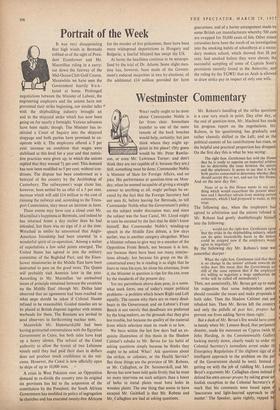Portrait of the Week
It was very disappointing that high winds in Bermuda robbed us of the sight of Presi- dent Eisenhower and Mr. Macmillan riding in a carry- car down the fairway of the Mid-Ocean Club Golf Course. Meanwhile we have seen the Government heavily b u n - kered at home. Prolonged negotiations between the Minister of Labour, the engineering employers and the unions have not prevented their strike beginning,. nor similar talks with the shipbuilding industry brought an end to the shipyard strike which has now been going on for nearly a fortnight. Various advances have been made, though. The Minister has in- stituted a Court of Inquiry into the shipyard stoppage and both parties have promised to co- operate with it. The employers offered a 5 per cent. increase on condition that wages were stabilised at this level for a year and that restric- tive practices were given up, to which the unions replied that they wanted 71 per cent. This demand has now been modified to 5 per cent. without con- ditions. The dispute has been condemned as a betrayal of the country by the Archbishop of Canterbury. The railwaymen's wage claim has, however, been settled by an offer of a 5 per cent. increase which will add £14 million to the cost of running the railways and, according to the Trans- port Commission, may mean an increase in fares.
These events may have cast a cloud over Mr. Macmillan's happiness at Bermuda, and indeed he has returned home a day earlier than he had intended, but there was no sign of it at the time. Wreathed in smiles he announced that Anglo- American friendship had been renewed 'in a wonderful spirit of co-operation.' Among a welter of superlatives a few solid points emerged. The United States has agreed to join the military committee of the Baghdad Pact, and the Eisen- hower missionaries in the Middle East have been instructed to pass on the good news. The Queen will probably visit America later in the year. According to Mr. Macmillan `no unresolved issues of principle remained between the countries on the Middle East' (though Mr. Dulles later observed that no agreement had been reached on what steps should be taken if Colonel Nasser refused to be reasonable). Guided missiles are to be placed at British disposal together with atomic warheads for them. The Russians are invited to send observers to forthcoming nuclear tests.
Meanwhile Mr. Hammarskjeild had been having protracted conversations with the Egyptian Government in Cairo, but both sides have kept up a heavy silence. The refusal of the Canal authority to allow the transit of two Lebanese vessels until they had paid their dues in dollars does not produce much confidence in the out- come. However, the Canal is now officially open to ships of up to 10,000 tons. , • A crisis in West Pakistan over an Opposition demand to re-divide the country into its original six provinces has led to the suspension of the constitution by the President; the South African Government has modified its policy of segregation in churches and has executed twenty-five Africans for the murder of five policemen; there have been more widespread deportations in Hungary and Bulgaria; a fearful blizzard has swept the US.
At home the headlines continue to be monopo- lised by the trial of Dr. Adams. Some slight men- tion has, however, been made of the Govern- ment's reduced majorities in two by-elections; of the additional £14 million provided for farm guarantees; and of a barter arrangement made by some British car manufacturers whereby 500 cars are swapped for 50,000 cases of fish. Other minor curiosities have been the result of an investigation into the smoking habits of schoolboys at a secon- dary modern school, which showed that 38 per cent. had smoked before they were eleven; the successful sampling of some of Captain Scott's provisions recently found in the Antarctic; and the ruling by the TGWU that an Arab is allowed to draw strike pay in respect of only one wife.


































 Previous page
Previous page